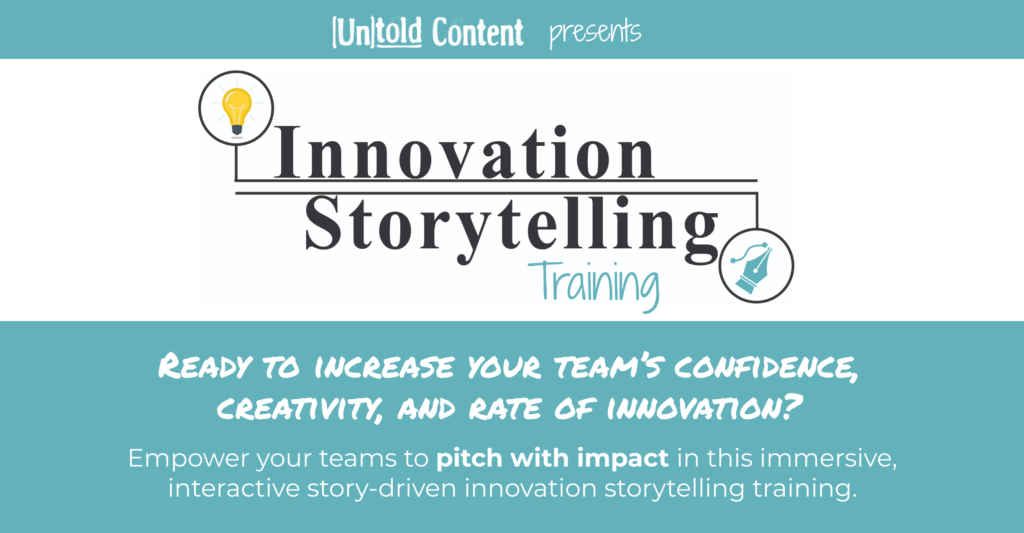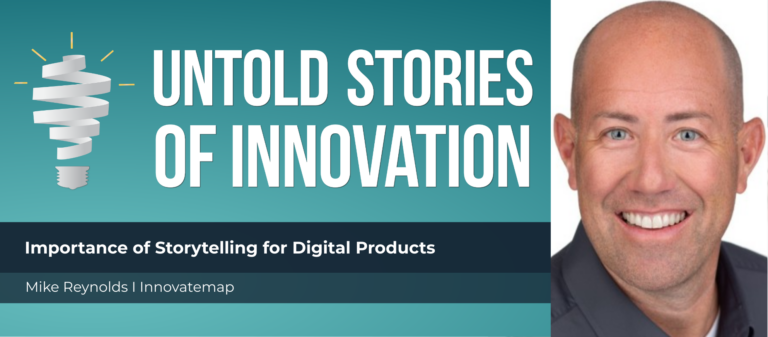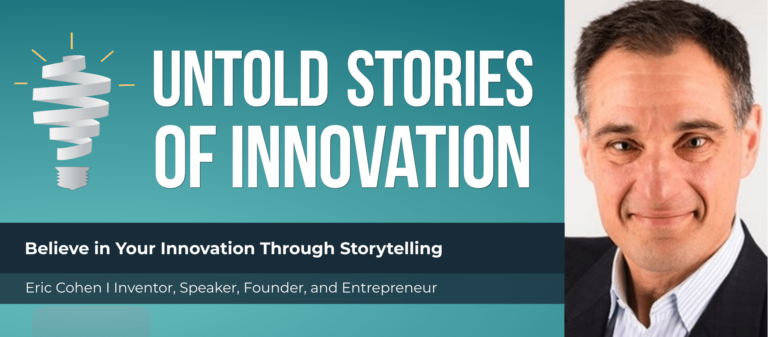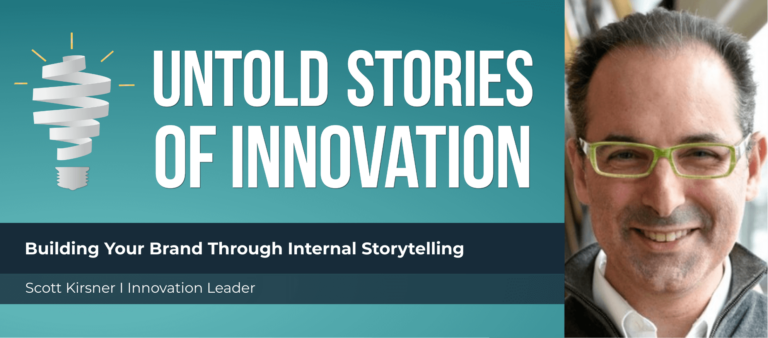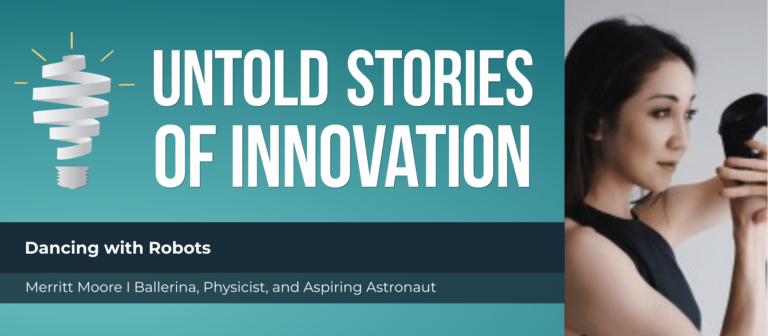Powering Access to Information in Medicine with Amy Beckley of MFB Fertility Inc.
Untold Stories of Innovation
“The whole mission is to empower people with information so they can advocate for themselves.” - Amy Beckley, CEO and owner of MFB Fertility Inc.
From today’s episode you’ll learn:
Why do stories matter to the innovation process? What values can be instilled in innovators who share stories? How do innovation leaders inspire creators to tell and share their success and failure stories?
We speak with Amy Beckley, scientist and CEO of MFB Fertility Inc. (follow: Facebook, Twitter, and LinkedIn). Amy, through her personal experience with hormone testing and the pain points that came with it, realized she wanted to create something that would help other women through their fertility journey. As she explains, they are not just a product company, but an education and support community. Check out our podcast episode to discover Amy’s personal innovation story, innovation goals, and advice for future innovators. Check out the MFB Fertility team and their product, the Proov test, on social media: Facebook, LinkedIn, Instagram, and Twitter and find their products at proovtest.com and on their app.
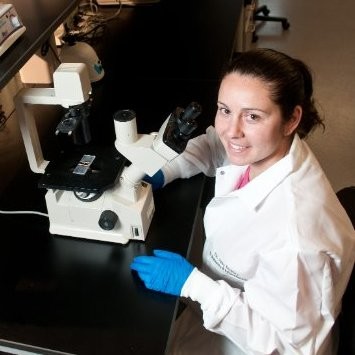
Amy Beckley is a scientist looking to change the way infertility is diagnosed and treated by creating innovative hormone testing devices. Amy hopes that by empowering women with information regarding their own fertility, they can advocate for themselves. To find out more about MFB Fertility Inc.’s Proov Test, make sure to check out Proov’s social media and app for giveaways, community, and personalized information.
untoldcontent.com/trainings/innovation-storytelling-training
TRANSCRIPT
This episode is powered by Untold Content’s innovation storytelling training. Increase buy in for your best ideas in this immersive and interactive, story-driven experience. Where your teams refine storytelling techniques for their latest projects, prototypes and pitches—and get inspired by 25 epic examples of impactful innovation stories. Learn more at https://untoldcontent.com/innovationstorytellingtraining-2/.
Katie Trauth Taylor: [00:00:04] Welcome to Untold Stories of Innovation, where we amplify untold stories of insight, impact and innovation. Powered by Untold Content. I’m your host, Katie Trauth Taylor.
Katie Trauth Taylor: [00:00:19] Our guest today is Amy Beckley. She is CEO and owner of MFB Fertility Inc. They are the makers of the Proov Test, the first clinically validated rapid response urine progesterone test, which lets women test their levels quickly and affordably in the comfort of their own homes. Amy, you describe your company as scientists looking to change the way infertility is diagnosed and treated by creating innovative hormone testing devices. Welcome to the podcast.
Amy Beckley: [00:00:47] Thank you. It is such a pleasure to be here.
Katie Trauth Taylor: [00:00:51] Thanks for joining us. Could you share where your personal story of innovation began?
Amy Beckley: [00:00:56] Yeah, absolutely. I’ve always known that I wanted to be a scientist and, you know, scientists have extra schooling. So I got a bachelors and then got a PhD and then did a postdoc, finally started a career and decided that it was time for my husband and I to start a family. And being this smart, educated, PhD-holding woman that I was, I thought it was going to be super easy to have a child. I mean, how hard could it be? We’re told just one time and you could have an unwanted pregnancy. So we started trying and trying and trying, and we just never were successful. I did get pregnant a few times and tragically lost those in the first couple weeks. And when I called different physicians saying, “Hey, there’s something wrong with me,” my science brain was definitely kicking in, going: “yeah, it should take… Not take this long. Something’s wrong. Something’s wrong.” But when I called the doctors, none of them wanted to treat me. They said, “you know what? You haven’t been trying long enough. You haven’t had enough miscarriages. And so we’re not going to give you additional testing. Just try on your own.” And that just made me very frustrated, very alone, very lost. And when we finally hit that magical twelve-month mark, we’d had two losses. We went and saw a reproductive endocrinologist and he ran a bunch of tests and he couldn’t find a single thing wrong with me. The diagnosis that I got was unexplained infertility, which is like the worst because you’re infertile and they have absolutely no reason why. So there had to be a reason. They just didn’t know what it was. So the only thing that I could do was IVF. They said, you know, you can continue trying and maybe you’ll conceive or you can do in vitro fertilization or IVF, which is about fifteen thousand dollars per cycle. And that is going to give me the highest chance at success. So – sick of waiting, sick of being frustrated, having losses – I was all in. I’m like, you do your magic on me, please. Like, I just want a baby. We went through two cycles. The first one was an epic failure. The second one looked like it was going to fail. But, you know, final hour, positive pregnancy test. And that turned into my son, who is almost 10.
Katie Trauth Taylor: Access to Information [00:03:34] Wow. Congratulations. Oh, my goodness. Amy, what’s so wild… The first time that we got to speak together is we have the exact same story up until your journey with IVF. I was able to get pregnant through other means, but literally every emotion, every experience from the miscarriages to the lack of understanding and the decision by my O.B. at the time to not really be very proactive and just sort of let those things happen without further testing and support. I can relate on such a deeply personal level and I know so many women can. If you’re listening to this podcast and I know we’re diving really deeply into personal stories about major pain points, right? There’s almost no deeper pain point, really, than infertility. It’s one of the deeper struggles that we have as humans. And we’re going to talk today about how to innovate in that space, which is so personal and such a difficult thing to experience for those of us who’ve been through it. And I bet even if listeners are listening and they think, well, I’ve never heard of anyone going through that… It’s far more common than you think. Is it that one in five?
Amy Beckley: Access to Information [00:04:47] Yeah.
Katie Trauth Taylor: Access to Information [00:04:47] I mean, pregnancies end in miscarriage, is that right, Amy?
Amy Beckley: Access to Information [00:04:50] It’s one in four pregnancies, end in miscarriage and one out of every five couples deals with infertility.
Katie Trauth Taylor: Access to Information [00:04:57] Wow. So.
Amy Beckley: Access to Information [00:04:58] So major…
Katie Trauth Taylor: Access to Information [00:04:58] We’re not alone.
Amy Beckley: Access to Information [00:04:59] Yeah. Yeah. And most people it’s a silent battle because it’s a very hard thing to deal with as a woman.
Katie Trauth Taylor: Access to Information [00:05:08] Yes.
Amy Beckley: Access to Information [00:05:08] And nobody wants to admit that this is happening. I mean, I didn’t want to tell anybody. It was… It was embarrassing. It made me feel less of a woman, you know, because I thought it was something easy. Like, look at all these people that can do it. Why couldn’t I? Why couldn’t I conceive? So…
Katie Trauth Taylor: Access to Information [00:05:26] Absolutely. Yes. To feel that pain point and go through it, that’s difficult enough. But you actually decided to lean in and apply your scientific knowledge to innovate against that. Tell us where that got started.
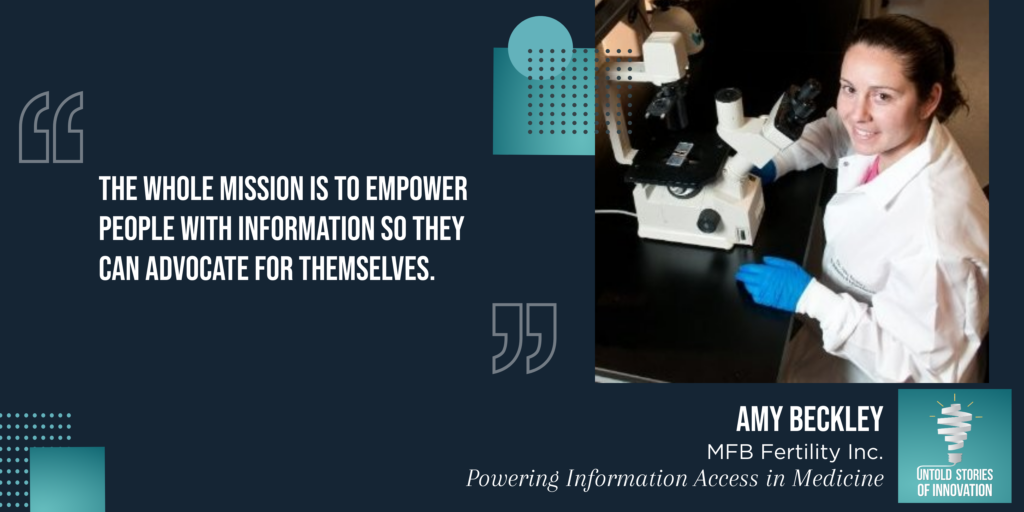
Amy Beckley: Access to Information [00:05:42] Yeah, absolutely. So when my son was about 18 months old, I turned to my husband and I said, you know what, I am crazy, but I think I want another child. And he was willing to kind of give it a go. But I said, you know what? This time I don’t want to do IVF. I really want to go back and talk to my doctor and try to diagnose what was wrong with me. And so, you know, being a scientist, I can have conversations with him in his office. We talked about all kinds of things like why do you think this didn’t work or why didn’t you do that? Or What did you find on this lab report? And I came up with this theory that I had improper ovulation. So ovulatory disorders are the number one cause of infertility. And, you know, obviously, ovulation is a process of creating an egg and you need an egg to be fertilized to get an embryo and then a baby. And I was obviously making eggs because I would get pregnant, but I would lose it. And so my theory was I didn’t have a healthy ovulation. My body just wasn’t prepared to receive that embryo and to nourish it through the entire pregnancy. So, you know, I had these conversations with my doctor and, you know, I was lacking a hormone called progesterone. And that was the theory. And I said, you know what? I don’t have enough. Can you just give me more? So they make bioidentical progesterone that you basically supplement your own progesterone with a medication that you can get prescribed. And so we did that. And within two months, I was pregnant and stayed pregnant. And she’s now almost seven.
Katie Trauth Taylor: Access to Information [00:07:26] Oh, my goodness. That’s a beautiful story. Wow. How incredible. And so it really was you figured out that the expensive IVF route was not necessary. There were other solutions.
Amy Beckley: Access to Information [00:07:37] Well, yeah. Yeah. I mean, my daughter was 100% natural and just needed a little bit of help. I mean, the supplement costs like 50 bucks a month. It wasn’t a huge expense. And I was like, wow, if women had this knowledge and could understand if they were ovulating properly, they could maybe potentially save themselves from IVF and waiting the arbitrary twelve months or, you know, not having a single miscarriage. Why does a woman have three miscarriages to get this kind of testing? It just blows my mind. And so…
Katie Trauth Taylor: Access to Information [00:08:08] Absolutely.
Amy Beckley: Access to Information [00:08:09] That was my soapbox. And that was why I invented this product. I said, “you know, women, couples, we deserve better. We should not have to sit around and wait. And we should empower ourselves and be able to have better conversations with doctors.” And so, you know, we invented a very easy way to track the quality of your ovulation. So are you ovulating? Is it a successful, healthy ovulation? And so it’s a simple urine-based test. You can go buy it off Amazon, our website, Target. Take it home, collect first morning urine, dip a strip and wait five minutes, read the number of lines. Super easy. We try to make it so accessible for women to do. And then if they’re not ovulating and they’re getting negative results: that’s amazing information and insight that they can take to their doctor and say, “you know what? I’ve only been, you know, trying to conceive for like four months. But I’ve been taking these tests and it shows that I’m just not ovulating. And let’s start the conversations now.” I mean, if a woman is not ovulating, I don’t care if she waits four months, six months, one year, two years, she’s not going to get pregnant. So why is there this arbitrary time limit? So that’s… The whole mission is just to empower people with information so they can advocate for themselves.
Katie Trauth Taylor: Access to Information [00:09:35] Yes, exactly. Can you tell us some of the challenges to disrupting the health care system in this way?
Amy Beckley: Access to Information [00:09:43] We’re creating a product and a category. You know, if you look… If you’re trying to conceive, the biggest product out there is: when am I fertile? How am I going to predict ovulation?
Katie Trauth Taylor: Access to Information [00:09:55] Yeah! Sort of like your typical pee-stick population test, right?
Amy Beckley: Access to Information [00:09:59] Yeah, yeah, yeah. And those are great for timing when to have intercourse. When am I fertile? But what they don’t tell you is: did I actually ovulate? And do I even have a chance at conception? Is my body prepared for that embryo if it was fertilized? And ovulation tests, it does exactly what it’s called, it’s an ovulation test. It’s not a: I’m predicting ovulation, it’s just ovulation. And so there’s a big misconception that, “oh, I had a positive ovulation test. I must have ovulated.” I mean, it’s not… it’s easy to understand why there’s a misconception, but we have to go in and communicate with women saying, yes, take the ovulation test, time intercourse, because that is very, very important, but also confirm healthy ovulation with Proov. You know, we work better together. We say that all over our packaging, all over our website. It’s like more information is power. And so it’s hard to educate consumers about how, you know, how this adds additional knowledge, an additional piece of information. In the beginning, it was very hard. Now it’s not as hard because there’s more people. We’ve helped a lot of women figure out the problem, talk to their doctor, get the treatment, and now they’re pregnant. And so we’re seeing more and more of these stories. I was on our…. I have a, we have a private message board for women so they can support each other and communicate because it is so isolating. We need to have a forum for women to connect and offer advice and help each other. And I was on it last night and I counted eight pregnancies and was just blown away.
Katie Trauth Taylor: Access to Information [00:11:47] Absolutely.
Amy Beckley: Access to Information [00:11:48] It’s just so beautiful.
Katie Trauth Taylor: Access to Information [00:11:51] Yeah, you know, community really can’t be stressed enough in this particular innovation challenge. Because, you know, the other challenge, too, is when you’re trying to look for community, it’s difficult to assess its credibility. You know, whenever a woman is typing in a question to Google about very specific changes in her body during, you know, ovulation or trying to get pregnant or during pregnancy, you can be presented with any number of forums that leads you down strange rabbit-holes that might convince you that, you know, one person’s experience is sort of like the be all, end all. It’s very difficult and it’s hard to find community, especially with other people who are going through the same thing, even though it is so common. So it’s beautiful that you’ve created that aspect of the product as well. And it’s not just the product itself.
Amy Beckley: Access to Information [00:12:46] Yeah. No, absolutely. And that was huge. Huge for us is we’re not just a product company, but we’re an education and a support community. We want to give knowledge. We recommend products all the time. We partner with sperm test companies or supplement companies or… just giving people access to good products and good information that’s going to help them… Lead them forward. I – you know – we started the community. We’re on Amazon because we realized that if you sell on your website, most of the I mean, I’m sure everyone knows this, but most of the reviews on people’s websites are not true. They’re not valid. Like, I don’t know, a single, you know, manufacturer’s website that’s got anything less than, like a four-point-eight star review rating. Right?
Katie Trauth Taylor: Access to Information [00:13:44] Sure. Sure.
Amy Beckley: Access to Information [00:13:44] So for me, it was very, very important to go on Amazon, where it’s a public forum and you can write reviews. And it wasn’t a biased system because I want people to have the products that they need. I want them to share what worked and what didn’t work and how it worked. And because I don’t want them to buy the product if it’s not right for them and I don’t want to sell them something that’s not going to help them.
Katie Trauth Taylor: Access to Information [00:14:10] Yeah, exactly.
Amy Beckley: Access to Information [00:14:10] So being very, very transparent and very open and, you know, when we sell our kits, it’s an open invitation to connect with us. We have: “take a picture, send it here,” like we have the majority of our staff is about communicating with the consumers and making sure that they get what they need out of the product. So we’re very, very consumer-focused. And that’s part of our brand values. Absolutely.
Katie Trauth Taylor: Access to Information [00:14:37] Yeah and it has to be when you’re introducing something that requires a bit of education, that’s sort of a new thing for consumers. It’s a new thing for health care providers to be convinced that this is important and it’s going to play a role in how they tackle this problem. So I think that makes a lot of sense that you would give a lot of care to the consumer experience and helping support them and educate them.
Amy Beckley: Access to Information [00:15:01] Yeah, absolutely.
Katie Trauth Taylor: Access to Information [00:15:03] So tell me, you know, as an innovator, did you think of yourself as an innovator before this life problem led you down the path of creating the Proov test?
Amy Beckley: Access to Information [00:15:15] Sort of. I mean. My first job was at a biotech company. We did drug development for cancer, and I thought that was just amazing that we were creating products that were changing lives. So I’ve always thought of, hey, I’m not going to be a scientist that just writes research that sits there. I’m gonna be the scientist that takes that research that all these other amazing scientists have done and make a product out of it. And, you know, we need both in this world. We need all kinds of people. And they’re really good at doing science. And I’m really good at taking that science and putting it into an innovative new technology, making it available for people. So I’ve always had that mindset. That’s what I want to do. It wasn’t until the purpose and the passion behind it, which was this is the product that I have to create.
Katie Trauth Taylor: Access to Information [00:16:07] Yes, absolutely. That makes so much sense. Do you – what do you think is next for Proov and your entrepreneurial journey?
Amy Beckley: Access to Information [00:16:16] You know, we’re really passionate about just getting people to their happy endings. And we’re doing a really good job of helping women detect problems. And we want to switch the focus to how do we get the treatment? How do we help them find the solution? So really closing that loop between detecting and solving. And so we’re building our platform to connect directly. So, you know, we have an analog test. It’s one line versus two lines. Very easy. But we built an app that basically digitizes that information. It makes it super easy. A woman opens the app: “oh, today I take this test, great.” Open camera, take test, reads it, graphs it, and then eventually it’ll build the graph for her and it will tell her, you know, results look good or hey, they’re not so good. You should reach out. And then we want to be able to connect those women to doctors that can treat them. So if she needs some type of medication treatment, that she can get those resources. And then the other side is there’s a lot of things you can do that don’t require going to the doctor. There are supplements, there’s foods, there’s certain lifestyle things that you can do to naturally put your body back into balance so that you can conceive naturally without even having to go to a doctor or getting any prescriptions. And so we’re building out that more holistic, natural approach to, you know, here’s what your hormones are saying. Here’s kind of what we recommend based on your unique profile that you do to change your lifestyle, to be more conducive to conception.
Katie Trauth Taylor: Access to Information [00:17:58] Amazing. Yeah, absolutely. So. So really, it’s this sort of, you know, full community. It’s a full educational experience as well as, of course, the product which helps inform. I remember, you know, at a personal level, just experiencing that the more information I could get my hands on, the better. And it was such – it was such a relief any time I could figure that out, in that particular journey. So that makes so much sense that you’re playing all those different strategies at the same time.
Amy Beckley: Access to Information [00:18:32] Yeah, yeah, I mean, women aren’t… We’re not robots. There’s not one thing that we want to do and we realize that women have all kinds of passions that they want to do and some want to go to doctors and some don’t. And so who are we to tell them it has to be X or has to be Y, but rather enable them to make those decisions and give them those resources that they can follow what their heart tells them to do?
Katie Trauth Taylor: Access to Information [00:19:00] Absolutely. Well, Amy, are there any other pieces of advice that you would give to other people looking to innovate?
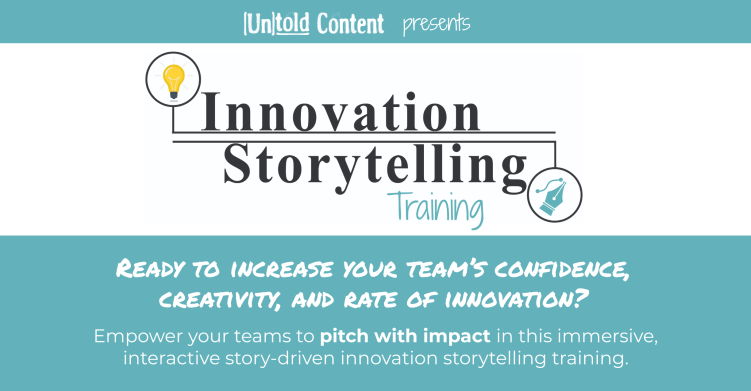
Amy Beckley: Access to Information [00:19:09] You gotta be passionate about what you’re doing. Just… you’ve got to. The journey has a lot of ups and a lot of downs. You have days where you’re just done. You have days where you’re like, “oh, this is amazing.” And the only thing that really gets you through is, is the passion. And if you don’t have that, it’s going to be very, very difficult to do. So it’s very, very rewarding. It’s very, very hard. So passion is definitely something.
Katie Trauth Taylor: Access to Information [00:19:45] Yes, and something that you can just read too, you know, it has to sustain you through all of the emotional ups and downs of entrepreneurship. So, yeah, I love that piece of advice. Where can our listeners find you on social media and online?
Amy Beckley: Access to Information [00:19:59] Yeah, @proovtest, so p r o o v test dot com is the website. It’s also the the social handles. We have a huge Instagram content strategies. We do a lot of education, giveaway. It’s, you know, “proovtest” is the handle. We’re also on Amazon, so you can go in, read reviews, learn about the products, see if it’s right for you. We are also at Target nationwide, online.
Katie Trauth Taylor: Access to Information [00:20:28] Exciting!
Amy Beckley: Access to Information [00:20:28] I know. I know.
Katie Trauth Taylor: Access to Information [00:20:29] That’s a big deal.
Amy Beckley: Access to Information [00:20:31] Yeah. Yeah. So. Yeah. I mean, it is really exciting. We also have a private Facebook group. If you go to our website, and you scroll to the top, it says “Proov Community.” You just click on that and you’ll go straight – it’s through Facebook because nobody wants another log in – is what, you know, we were told, which I totally get. It’s through Facebook and we let anybody in the group that wants to learn about it. They don’t have to have already purchased it. They just want to browse and see what it’s all about. I had a test, ask questions, whatever it is. So we encourage people that are going through this battle. They don’t know if this is really the right thing for them. They have questions about whatever it is, you know, join the group, connect with women. We have an amazing, amazing group of women in there that is just a really awesome free resource for anybody who’s struggling because anything we can do to help them struggle less is our mission.
Katie Trauth Taylor: Access to Information [00:21:34] Amazing. That’s wonderful. Thank you so much for the advice and thank you for sharing your thoughts on innovation and the stories that have emerged and the passion that has really driven you to scale your business and be so successful. I’m so grateful to have had you on the podcast, Amy.
Amy Beckley: Access to Information [00:21:51] Yeah. Thanks so much for having me.
Katie Trauth Taylor: Access to Information [00:21:55] Thanks for listening to this week’s episode. Be sure to follow us on social media and add your voice to the conversation. You can find us @untoldcontent.
You can listen to more episodes of Untold Stories of Innovation Podcast.
*Interviews are not endorsements of individuals or businesses.

